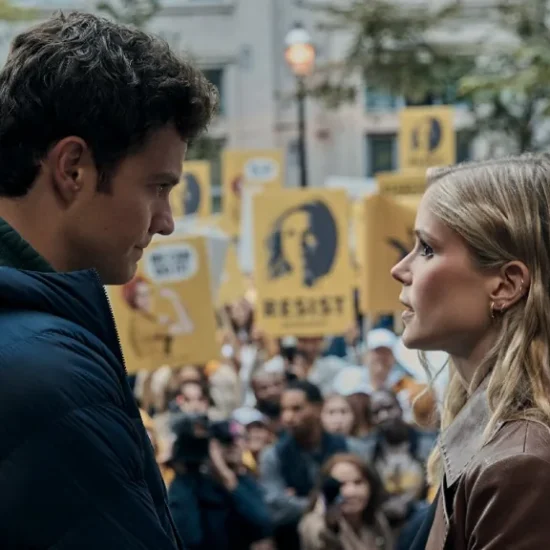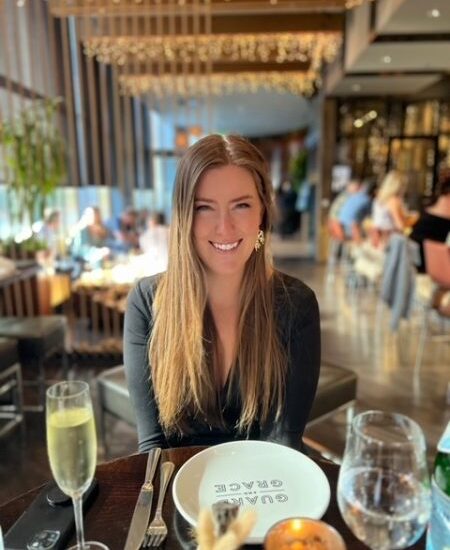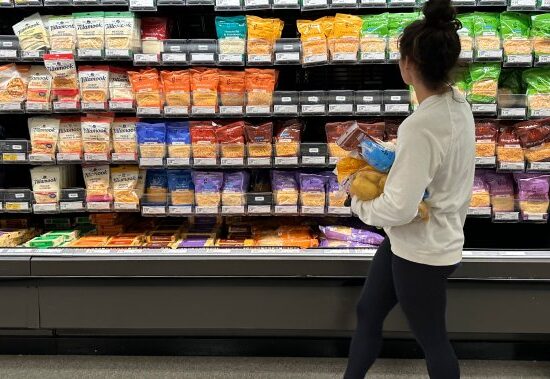
Editor’s Note: a version the following post originally ran way back in 2015. It’s being re-posted here (with minor edits) to celebrate—what else?—THANKSGIVING. All three seasons of Hannibal (NBC, 2013-2015) are now streaming on Tubi. Special thanks to author Tom Sveen.
***
With the rise of foodie culture, there are more movies and television shows about the culinary arts than ever before. But perhaps none of them has as ardent a following as the sadly-canceled Hannibal, in which it’s not turkey or ham but the show’s characters who are on the menu. With Thanksgiving just around the corner, we caught up with Hannibal food stylist Janice Poon to talk about her holiday traditions, Mads Mikkelsen’s eating habits and what might be on Hannibal’s table this holiday season.
JANICE POON, FOOD STYLIST
Happy Thanksgiving, Janice. You’re in Canada, right? So you’ve already had your Thanksgiving?
Poon: Happy Thanksgiving to you! Yes, we up here in Canada had to get things in early because it gets so bloody cold and the animals all flee. So if we want to harvest them we have to get out there while it’s still warm.
As a food stylist, does all of the build up of Thanksgiving excite you, or is it more pressure than you would like?
Poon: It used to be fun when I was younger. When you’re in the food industry, people are nervous about inviting you over. And now that I live far away from my family, I don’t celebrate a traditional family Thanksgiving. Instead, I have it with friends and that, too, is fraught with tradition. [In Canada] we have a new thing that’s starting a bit. Just like in the US, it’s a country of immigrants. There are so many new Canadians. So some families are inviting a new Canadian family to their home to experience the great North American brainwashing thing where we all sit around and pretend it’s great. It kind of is, though. I mock it, but it is great.
There’s a nice release that comes at the end of all that pressure.
Poon: Oh, there really is. And you’re glad you did it, except that everyone takes off and leaves with you with the dishes.
You should put a sign about that on the door on the way in so that there’s a contract in place.
Poon: That’s a good idea. Because it’s unspoken, but it’s too unspoken. It used to be that there would always be a couple of people who would stick around and help you clean up. And that doesn’t seem to be the case now. It’s all too much to bear because most of the cooking often falls on me, to the extent where I’m invited somewhere and then end up cooking because, “Oh, you’re so much better at it.” But it’s all right. I actually enjoy it. I wouldn’t do it if I didn’t enjoy it. I guess that kind of sums up the whole holiday in a nutshell. You kind of enjoy it, after all. But it is very much that golden bird coming to the table and looking like a golden sacrifice to the gods. Because all of our holidays have religious origins… Well, Thanksgiving’s not one of them is it. Thanksgiving is a real thing that happened because the Pilgrims and the natives actually got along at one point.
Yeah, supposedly that happened. It’s been mythologized a little bit.
Poon: You know, you’re giving me an idea. It could be a case of history re-written and it wasn’t a turkey; it was some unfortunate person on the wrong side of victory.
Or just somebody who was weak and they knew wouldn’t make it through the winter.
Poon: Oh, good grief. It’s so good to not be a Pilgrim!
Now that we’re on the topic of eating people for Thanksgiving, what do you think Hannibal might be having for his holiday feast this year?
Poon: Well, is he in jail or out of jail? If he’s out of jail, there’s no question that he would roast some “turkey.” I mean there are so many of them out there, right? He would bone them and he would stuff them, with a sausage stuffing, no doubt, because you know how he adores stuffing. Probably giblets too because he loves all of that organ meat. He might fashion it into a bird, but I rather think that he would do a roll because he likes to alter things. So I think he would just stuff it as a roll. I’ve done turkey that way—chicken as well—where you bone it but you leave the skin on. You put your ground meat inside or you can use a regular bread stuffing. And you roll it back up and you tie it up in kind of a cylinder. And then you roast that and it’s a really good way to do it because you know how the breast meat always cooks faster than the dark meat. So you can place the meat around so that the dark meat is on top and will get more of the heat.
Poon: Another thing he might do: he did poor Dr. Gideon’s [played by Eddie Izzard] thigh roasted in clay, where he wrapped it in a big leaf and then wrapped it in clay. It’s an ancient way of slow-roasting meat. You put it in clay and then you bring it to the table in the clay and you crack it open and presumably all of the lovely aromas waft out into the room. Except for some people are gagging because they know it’s the neighbor.
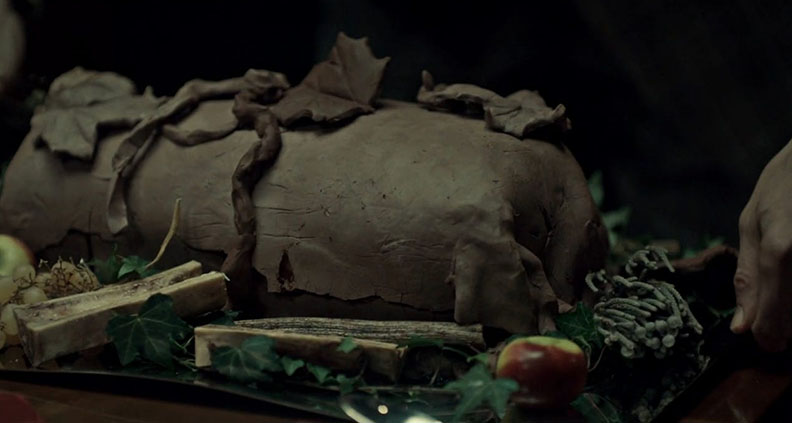
Poon: Of course, the table would be loaded with food because Hannibal’s table always has to be over the top. So one of the things that I like for potatoes: do you remember when he spliced Beverly [Hettiene Park] up like an MRI? She was made into piece of artwork like Damien Hirst, where she was poly-sected into these very thin pieces. And so with the potatoes, you could do what I call potato fans, where you take a potato and you make a cut every eighth inch, basically one-eighth inch slices, but you’re not slicing all the way through the bottom. You make these cuts all along the side and you drench that in butter and you put it in the oven and you roast it and then halfway through the roasting, pour more butter on it because it will have fanned out a bit. And because it’s Thanksgiving you really get to overdose on all of the fat.
I see. And what other paints do you have on your palette? Pun not intentional.
Poon: You need a vegetable. Hannibal doesn’t adore the vegetables, but I always throw some on because, as a food stylist, you’re limited by meat because it’s brown. So you have to bring in produce because that’s where all the color is. But maybe he used some scraps from his victims to fertilize his garden. Or maybe he’s eating his vegetables from bone china.
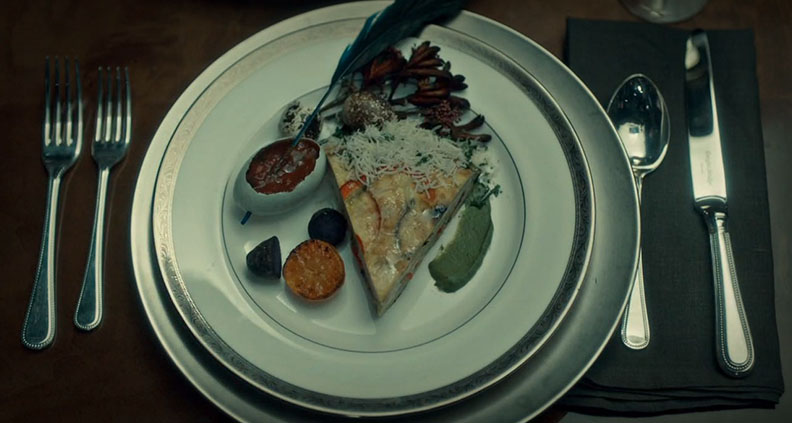
Does Hannibal eat dessert?
Poon: Oh yeah. He does dessert. He’s done a wonderful bread pudding. The desserts don’t necessarily have people in them, but they’re good for metaphors. And the other thing that they’re good for is the actors need business. They can’t just sit there and deliver expository dialogue. So there’s some of that going on in Hannibal because he’s quite a Chatty Cathy.
What’s your favorite dish that you’ve made for Hannibal?
Poon: I think my favorite thing to make was the very last meal [pictured above], the last scene in Season Three, that season which we hope is not our last. Bedelia is sitting down to a marvelous roast of her own leg. It’s wrapped in leaves and it’s surrounded with flowers and tropical fruit and beautiful roses. And also ice and coal, which represent Dante’s sixth and ninth Circles of Hell. In the last episode there were many references to Dante: some spoken and most just in the set decoration and the food and other subliminal references. And really I think that’s one of the things that makes Hannibal such a rich experience to watch, because every department is saying, “I’m not going to be the slacker who’s just being literal.” Everything had to mean something. And we were all so committed to making everything have context beyond context. And in so many ways it was because of the reaction from fans, who are so engaged. I’ll always put things in and think I’m a tree falling in the forest, but then you realize that people are actually seeing it and they actually want to know more and I ended up writing a blog because of it. I think it’s a wonderful time to be, not just a filmmaker, but an artist of any kind because you can have real communication with your audience.
Do you use real food as a food stylist? Are there a lot of non-edible elements that go into it to make things look good?
Poon: For film, it has to be edible. Even if the director says it’s not going to be eaten, you never know. Because in a series especially, you’re allowed hours and hours of character development. And the actors get very involved with what their character would do and what they would not do. And they’re just as likely as not to say, “My character would reach out and grab that and nibble on it.” So anything on the table, or on the set practically, that is presented as something edible has to be edible. And so often actors have dietary restrictions and you have to make sure you abide by those too. You have to treat your stars well because they are the face [of the project]. Everything I do for the food—I want it to taste good, I want it to smell good—all these things are not going to come across [on screen], but I want to help the actor do their job. I want them to feel like they’re in that scenario. So the better the food tastes, the easier it is for them. It has to be edible, but I don’t want it to be weird. Liver is a good example. Not everybody likes liver. So I would make something that looks like liver for the eating scenes.
Does Mads [Mikkelsen, who plays Hannibal Lecter] like liver?
Poon: It’s funny that you ask me that because he is a total omnivore, a very adventurous eater. And you know when you’re just getting to work together for the first time and everybody’s getting to know each other, and I had to feed Mads lung, liver and heart. And I didn’t know him well enough. I’d given him a cooking tutorial and that was fine but I neglected to ask him about his food tastes—and you really never know because people will say that they will eat anything, but then they get to set and say, “Except that.” So you’ve got to be ready for everything. And I thought, “I don’t really want to worry about pathogens. There are so many things I don’t worry about this first day.” So I thought I would just carve liver out of mortadella, which is like bologna. And the lung was a bit of a problem because even if he did like it, it’s not easy to chew. And that’s the other thing: you can’t have the actors chewing too much. So I used salami for that because salami is flecked with little white dots that sort of look like the air sacs of a lung.
How did the actors respond to that?
Poon: Mads was so disappointed that I didn’t bring the real thing. He said, “Oh, I was really looking forward to tasting that. And so from then on, I brought both the real thing and whatever I was using. Because Mads was not the only one that was curious. The director was curious. [Laurence] Fishburne was curious. Hugh [Dancy] was curious. They were all interested. My food station was always right beside the set so that we could run the food back and forth. So they were always hanging out there.
So when you’re giving them “the real thing,” what animal are you giving them?
Poon: The real thing was often pork, because pork is very low-pathogen. Or beef, because beef is the lowest-pathogen. Sometimes chicken. It all depends. It’s always safety first. My main goal is not to kill the actors. And then after that, it’s to make the food tall enough so that the camera will catch it. Because I can load the table up with beautiful things and make the plate totally gorgeous, but if it’s in that space where the camera never is, my food will never be seen. So I like my food to be tall and colorful.
Do you employ any of the same standards of presentation when you’re cooking for your friends at Thanksgiving?
Poon: Well, I always try to make the food look beautiful. I think that a beautifully garnished dish, when you bring it to the table—and it just takes a second to add a little ruffle of greens or a couple of cherry tomatoes or some bay leaves—it’s like gift wrap. So they pause for a minute before they lunge in and say, “Ah, this looks delicious.” If you just flop it on, it could be delicious, but people won’t stop. And this little garnish says, “I’ve thought about this. And I’ve thought about you. And I made this for you. Do what you will. Write me a thank you note.”
And wash the dishes.
Poon: And wash the dishes! Or just come and do a bit of scraping.
Film Independent promotes unique independent voices by helping filmmakers create and advance new work. To become a Member of Film Independent, just click here. To support us with a donation, click here.
Want to receive screeners and vote for the winners of the 2024 Film Independent Spirit Awards? Join. Watch. Vote.









